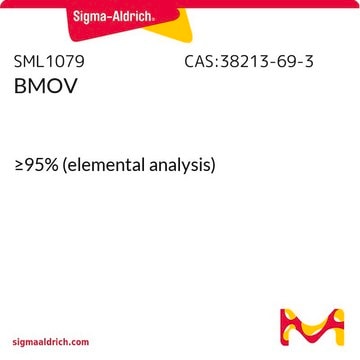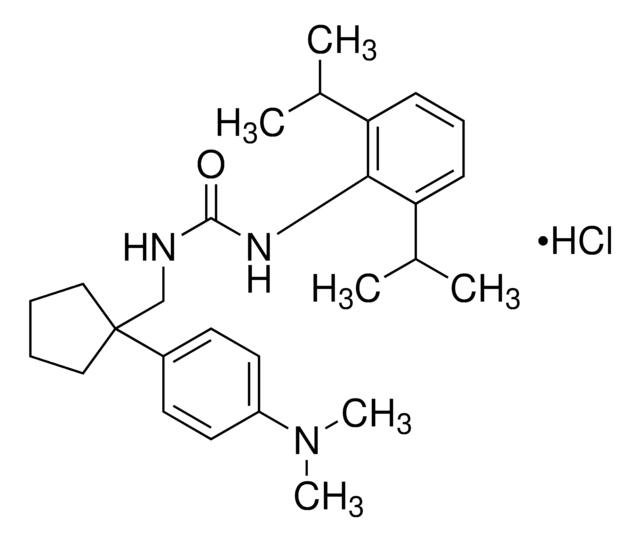SML1837
K-604
≥98% (HPLC)
别名:
2-[4-[2-(Benzimidazol-2-ylthio)ethyl]piperazin-1yl]-N-[2,4-bis(methylthio)-6-methyl-3-pyridyl]acetamide dihydrochloride, 4-[2-(1H-Benzimidazol-2-ylthio)ethyl]-N-[6-methyl-2,4-bis(methylthio)-3-pyridinyl]-1-piperazineacetamide dihydrochloride, K604
登录查看公司和协议定价
所有图片(1)
About This Item
推荐产品
品質等級
化驗
≥98% (HPLC)
儲存條件
desiccated
顏色
white to beige
溶解度
DMSO: 10 mg/mL, clear
儲存溫度
2-8°C
SMILES 字串
O=C(NC1=C(SC)C=C(C)N=C1SC)CN2CCN(CCSC3=NC4=CC=CC=C4N3)CC2.[H]Cl.[H]Cl
生化/生理作用
K-604 inhibits against acyl-coenzyme A (acyl-CoA):cholesterol O-acyltransferase-1 (ACAT1, SOAT1) activitiy in a selective (IC50 = 450 nM vs. 102.85 μ M against human ACAT1 and ACAT2, respectively) and acyl-CoA-competitive (Ki = 378 nM against oleoyl-coA) manner. K-604 inhibits cholesterol esterification in human monocyte-derived macrophages (IC50 = 68.0 nM) and enhances cholesterol efflux from THP-1 macrophages in response to HDL3 or apolipoprotein A-I. Oral administration is efficacious against macrophage foam cell formation and atherosclerosis progression among F1B hamsters on a high-fat diet (1-10 mg/kg/day) and apoE-knockout mice (60 mg/kg/day) without affecting plasma cholesterol levels. K-604 is also reported to stimulate autophagy-mediated P301L-Tau degradation in cortical neurons from 3XTg-AD mice (500 nM).
儲存類別代碼
11 - Combustible Solids
水污染物質分類(WGK)
WGK 3
閃點(°F)
Not applicable
閃點(°C)
Not applicable
Emily R Stevenson et al.
The Journal of pharmacology and experimental therapeutics, 382(3), 356-365 (2022-08-16)
Acute lung injury (ALI) is characterized by epithelial damage, barrier dysfunction, and pulmonary edema. Macrophage activation and failure to resolve play a role in ALI; thus, macrophage phenotype modulation is a rational target for therapeutic intervention. Large, lipid-laden macrophages have
Mami Ikenoya et al.
Atherosclerosis, 191(2), 290-297 (2006-07-06)
Acyl-coenzyme A:cholesterol O-acyltransferase-1 (ACAT-1), a major ACAT isozyme in macrophages, plays an essential role in foam cell formation in atherosclerotic lesions. However, whether pharmacological inhibition of macrophage ACAT-1 causes exacerbation or suppression of atherosclerosis is controversial. We developed and characterized
Yohei Shibuya et al.
Neurobiology of aging, 36(7), 2248-2259 (2015-05-02)
Patients with Alzheimer's disease (AD) display amyloidopathy and tauopathy. In mouse models of AD, pharmacological inhibition using small molecule enzyme inhibitors or genetic inactivation of acyl-coenzyme A (Acyl-CoA):cholesterol acyltransferase 1 (ACAT1) diminished amyloidopathy and restored cognitive deficits. In microglia, ACAT1
Yasunobu Yoshinaka et al.
Atherosclerosis, 213(1), 85-91 (2010-09-17)
Acyl-coenzyme A:cholesterol O-acyltransferase-1 (ACAT-1) plays an essential role in macrophage foam cell formation and progression of atherosclerosis. We developed a potent and selective ACAT-1 inhibitor, K-604, and tested its effects in apoE-knockout mice. Administration of K-604 to 8-week-old apoE-knockout mice
Rik van der Kant et al.
Cell stem cell, 24(3), 363-375 (2019-01-29)
Genetic, epidemiologic, and biochemical evidence suggests that predisposition to Alzheimer's disease (AD) may arise from altered cholesterol metabolism, although the molecular pathways that may link cholesterol to AD phenotypes are only partially understood. Here, we perform a phenotypic screen for
我们的科学家团队拥有各种研究领域经验,包括生命科学、材料科学、化学合成、色谱、分析及许多其他领域.
联系技术服务部门








